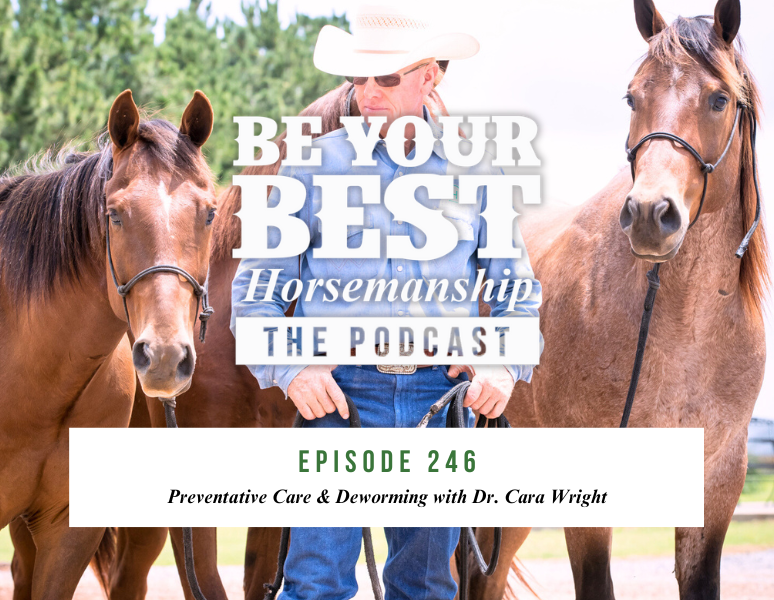Ep 246: Preventative Care & Deworming with Dr. Cara Wright from Merck Animal Health
In this podcast episode, I had the pleasure of hosting Dr. Cara Wright, DVM, MS, IVCA, a Senior Equine Professional Services Veterinarian for Merck Animal Health. We discussed a variety of preventative health measures for horses, offering valuable insights that help keep your horse in the optimal performance condition. Whether you're at home, at a training facility, or on the road, these measures apply universally. Tune in to hear Dr. Wright’s advice and expertise in preventative health, biosecurity, and deworming.
Meet Dr. Cara Wright, DVM, MS, IVCA
Dr. Wright's journey into veterinary medicine is both fascinating and inspiring. Growing up near Washington, DC, her passion for horses began at a young age. From attending horseback riding camps to working at barns, her early experiences shaped her career path. She pursued her undergraduate degree in the DC area, followed by a master's degree at Louisiana State University, focusing on reproductive characteristics in high body condition mares. Her veterinary studies took her to Virginia Tech, and she later completed an internship in Ocala, Florida, where she stayed in private practice for several years.
Dr. Wright's career has been diverse, including a stint in Europe, where she provided relief work for equine vets. This opportunity allowed her to experience veterinary practices across different geographies, enhancing her understanding of how location-specific factors influence veterinary care. Today, Dr. Wright resides in California, working with Merck Animal Health and continuing to provide equine care part-time.
Key Preventative Health Measures
Our conversation emphasized the importance of paying attention to detail and doing the little things right. Preventative health measures are crucial for maintaining the well-being of your horse, especially given the advancements in horse genetics and the increasing competitiveness in equine sports. Dr. Wright shares a few best practices and key preventative health measures that horse owners can take to minimize the risk of infectious disease, both at home and on the road:
Develop a Relationship with Your Veterinarian: Your personal veterinarian is your best resource for understanding your horse's health history and risks. They can recommend tailored vaccination protocols and biosecurity measures to keep your horse healthy, especially when traveling or introducing new horses to your facility.
Vaccination Protocols: Proper vaccination protocols are essential to protect your horse from infectious diseases. Regularly updating vaccines and consulting with your veterinarian about specific risks associated with different regions and climates are critical steps.
Biosecurity Measures: Implementing biosecurity measures can significantly reduce the risk of disease transmission. Isolate new arrivals, minimize contact between traveling horses and those that stay home, and maintain good hygiene practices. For example, avoid sharing water buckets and hoses to prevent the spread of pathogens.
Temperature Monitoring: Regularly monitoring your horse's temperature can help detect illnesses early. Some barns now use microchips that read temperatures with a scanner, providing a quick and non-invasive way to monitor health trends.
Hydration and Nutrition: Plan your travel to accommodate temperature variations and ensure your horse stays hydrated and well-fed. Horses should have access to water and food during travel, and it's essential to take breaks to allow them to lower their heads, which helps clear their respiratory tracts and prevent infections.
Use of Electrolytes: Administering electrolytes before and during travel can help maintain hydration and prevent issues related to dehydration, especially in hot weather.
The Dos and Don’ts of Deworming
Deworming is a critical aspect of horse care that has evolved significantly over the years. While everyone knows the importance of deworming, the approach to it has changed due to advancements in science and understanding of parasites. Often, horse owners impulsively buy dewormers from the store and administer them, feeling better for having done so. However, there's more to deworming than just purchasing and giving the medication. Dr. Wright shares that the American Association of Equine Practitioners (AAEP) has recently updated guidelines on deworming, highlighting the issue of resistance to many dewormers. The goal of deworming is not to eliminate all parasites from every horse but to prevent disease caused by parasites and manage the parasite burden.
Different environments and lifestyles of horses require different deworming strategies. For instance, a horse in a show barn in California might have different needs than a horse on a 40-acre farm in New England. Therefore, it's essential to work with your veterinarian to determine the best deworming plan for your specific situation. This often involves performing fecal egg counts to assess the parasite burden in your horses.
Fecal egg counts are crucial as they help identify which horses in your herd are "high shedders," meaning they have a higher parasite load and might need more frequent deworming. This targeted approach can save money and reduce the risk of resistance developing in parasites. While it may seem cheaper to buy and administer dewormers regularly, over time, targeted deworming based on fecal egg counts is more cost-effective and better for the health of your horses.
Most veterinarians can perform fecal egg counts or send samples to a lab, providing results within a day. Implementing a routine of collecting and testing fecal samples twice a year can help streamline your deworming practices, reduce medication usage, and prevent potential health issues in your horses. This simple protocol can be as easy as taking a horse’s temperature and can prevent a lot of trouble down the line.
Deworming should be approached with a strategy informed by scientific understanding and tailored to your horses' specific needs. By working closely with your veterinarian and utilizing fecal egg counts, you can ensure your horses are healthy, minimize the risk of resistance, and potentially save money in the long run.
The Importance of Preventative Health Measures
As the saying goes, “an ounce of prevention is worth a pound of cure.” Preventative health measures are foundational to maintaining the health and performance of your horse. By developing a strong relationship with your veterinarian, implementing effective vaccination and biosecurity protocols, and paying attention to hydration and nutrition, you can ensure your horse remains healthy and ready for any challenge. Dr. Wright's insights highlight the importance of these measures and offer practical advice for horse owners everywhere.
Remember, the details matter. Taking the time to implement these preventative measures can save you and your horse from potential health issues, allowing you to focus on training and progressing your performance with your horse.




